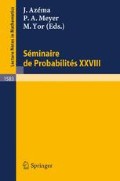Abstract
We show that the probability measures resulting from conditioning different random walks in an exponential family to stay nonnegative coincide with the measures obtained by taking one member of the family and conditioning it both to stay nonnegative and to go to infinity at a prescribed rate. This extends results in [1] where this relation was established for certain special members of an exponential family.
Access this chapter
Tax calculation will be finalised at checkout
Purchases are for personal use only
Preview
Unable to display preview. Download preview PDF.
References
Bertoin, J. and Doney, R.A.: On conditioning a random walk to stay nonnegative, Ann. Probab. (to appear).
Bingham, N.H., Goldie, C.M., and Teugels, J.L.: Regular Variation. Cambridge University Press 1987, Cambridge.
Doob, J.L.: Discrete potential theory and boundaries, J. Math. Mecha. 8 (1959), 433–458.
Keener, R.W.: Limit theorems for random walks conditioned to stay positive, Ann. Probab. 20 (1992), 801–824.
Petrov, V.V.: On the probability of large deviations for sums of independent random variables. Theory Probab. Appl. 10 (1965), 287–97.
Revuz, D.: Markov Chains. North Holland 1975, Amsterdam.
Spitzer, F.: Principles of Random Walks. Van Nostrand 1964 Princeton.
Veraverbeke N. and Teugels, J.L.: The exponential rate of convergence of the maximum of a random walk. J. Appl. Prob. 12 (1975), 279–288.
Author information
Authors and Affiliations
Editor information
Rights and permissions
Copyright information
© 1994 Springer-Verlag
About this paper
Cite this paper
Bertoin, J., Doney, R.A. (1994). On conditioning random walks in an exponential family to stay nonnegative. In: Azéma, J., Yor, M., Meyer, P.A. (eds) Séminaire de Probabilités XXVIII. Lecture Notes in Mathematics, vol 1583. Springer, Berlin, Heidelberg. https://doi.org/10.1007/BFb0073840
Download citation
DOI: https://doi.org/10.1007/BFb0073840
Published:
Publisher Name: Springer, Berlin, Heidelberg
Print ISBN: 978-3-540-58331-8
Online ISBN: 978-3-540-48656-5
eBook Packages: Springer Book Archive

